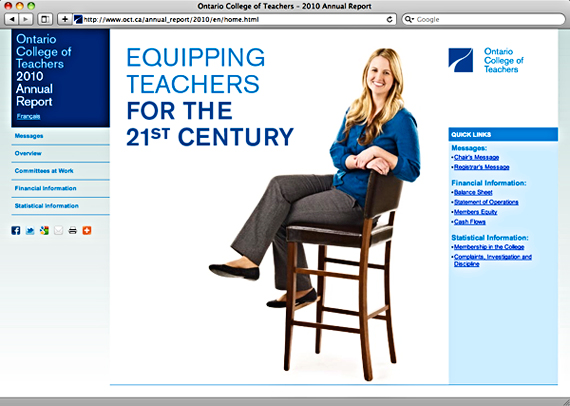Governing Ourselves informs members of legal and regulatory matters affecting the profession. This section provides updates on licensing and qualification requirements, notification of Council resolutions and reports from various Council committees, including reports on accreditation and discipline matters.
2010 ANNUAL REPORT
Equipping Teachers for the 21st Century
Equipping Teachers for the 21st Century profiles teachers who are as committed to learning as they are to teaching.
Teachers are taking College-accredited Additional Qualification (AQ) courses in record numbers as they strive to continually improve the knowledge and skills they need to help students learn, grow and thrive.
The College is committed to encouraging accessibility to these AQ courses because of the value they offer to our members. We continue to update courses to ensure that they reflect the needs of today's classrooms.
Highlights of the College's work in 2010 also includes our research on teacher supply and demand, our work in teacher certification and our support to members throughout their careers.
Is there any work out there?
The College's Transition to Teaching study presents an in-depth look at the early careers of new members from 2005 through 2009.
Two stories have emerged. Growing numbers of English-language teachers are underemployed, and the market for French-language teachers is less robust than in the past. The rate of first-year regular-job success for French-language teachers fell for the first time in six years – to 51 per cent from 72 per cent the previous year.
The province's English-language teacher employment market is highly competitive. There are now roughly 7,000 more certified teachers entering the profession each year than there are retirement spots to fill. The job situation is particularly acute for new teachers qualified in the Primary-Junior divisions. Across the province Ontario's new teachers are increasingly relying on occasional teaching assignments as their introduction to the teaching profession.
Teacher qualifications
The College has developed or revised 123 courses on a wide range of subjects over the last two years. Teachers can now take AQs in areas such as mentoring, American Sign Language, outdoor experiential education and inclusive education. Ontario's AQ program offers courses that are pertinent and reflect what the teaching profession needs in the 21st century.
As part of the College's efforts to facilitate certification, we have extended our online system to allow individuals from all over the world to complete and submit an application to become an Ontario Certified Teacher electronically.
The College's new address
In 2010 we moved to a new, permanent home. The College purchased eight floors in a building located at 101 Bloor Street West, one block west of Bay in downtown Toronto. We are centrally located to provide easy access by public transit for members and staff, and in close proximity to stakeholders, government and education partners.
Improving the environmental footprint of the new building is a high priority for us. Energy efficiency, a key feature of the building, dovetails with the College's commitment to environmental responsibility. We are seeking LEED (Leadership in Energy and Environmental Design) certification – a green building rating system – for our new home. We want our new building to be smarter and greener, while reducing energy and water consumption as well as operating costs.
Financial highlights
For 2010 the College budget was set at $32,841,000, with an anticipated deficit of $543,000. The final deficit was $841,000, reflecting the writeoff of $418,000 for leasehold improvements at 121 Bloor East. Overall the College tracked very close to the budget, and the variance represents less than three per cent of the total budget, including the one-time leasehold writeoff.
The College is financed primarily by members' fees. At the end of 2010 the College had 230,122 members in good standing, an increase of 5,638 over 2009.
Bilingual services
The increased number of staff members with proficiency in both English and French has contributed to significant improvements in our services to members in areas such as Client Services and French-language publications. The College's French-language services report highlights these achievements.
We continue to improve the French-language capacity of staff in various College departments and work to ensure that our French-language publications reflect the challenges, realities and distinct nature of our diverse French-language education community in Ontario.
Ontario College of Teachers
for the year ended December 31, 2010
(in thousands of dollars)
| Revenue | 2009 | 2010 |
| Annual membership fees | 27,747 | 27,048 |
| Other fees | 2,879 | 2,950 |
| Advertising | 1,028 | 1,093 |
| Amortization of deferred capital contribution | 311 | 226 |
| Special projects | 171 | 205 |
| Teach in Ontario project | - | 666 |
| Interest and other | 226 | 419 |
| 32,362 | 32,607 | |
| Expenses | ||
| Employee compensation | 17,481 | 17,164 |
| Council and committees | 742 | 780 |
| Services to members and applicants | 3,063 | 3,135 |
| Professional practice | 509 | 546 |
| Investigations and hearings | 2,085 | 2,053 |
| Operating support | 6,834 | 5,622 |
| Teach in Ontario project | - | 666 |
| Amortization | 2,489 | 1,311 |
| Council elections | - | 367 |
| 33,203 | 31,644 | |
| Excess (deficiency) of revenue over expenses for the year |
(841) | 963 |
